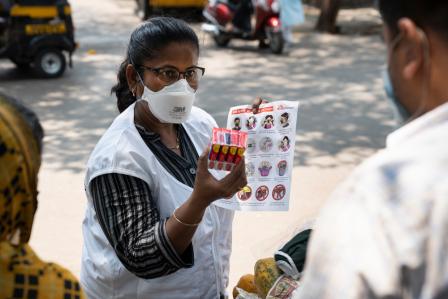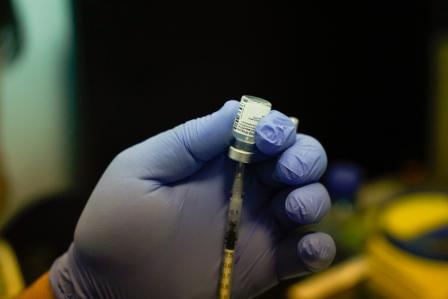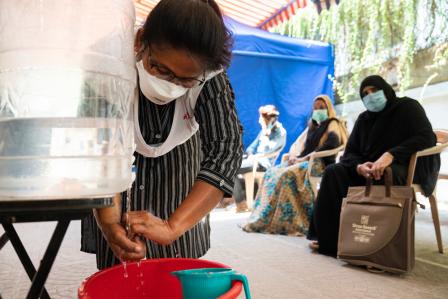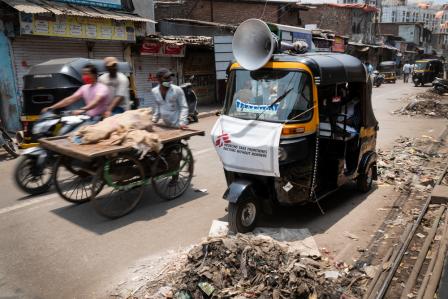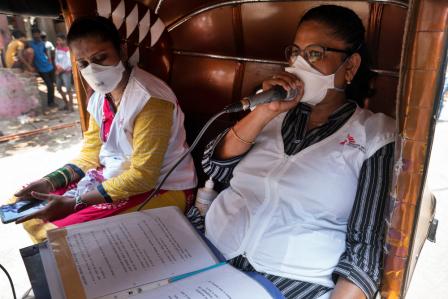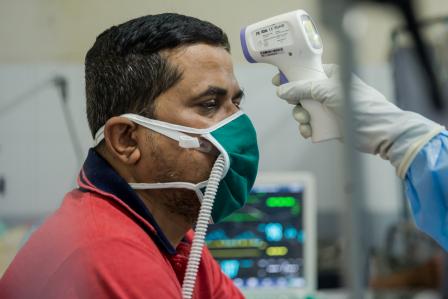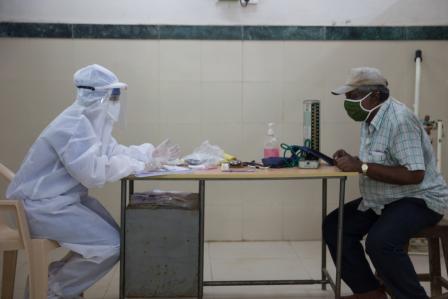India: "We’re not able to find enough nurses"
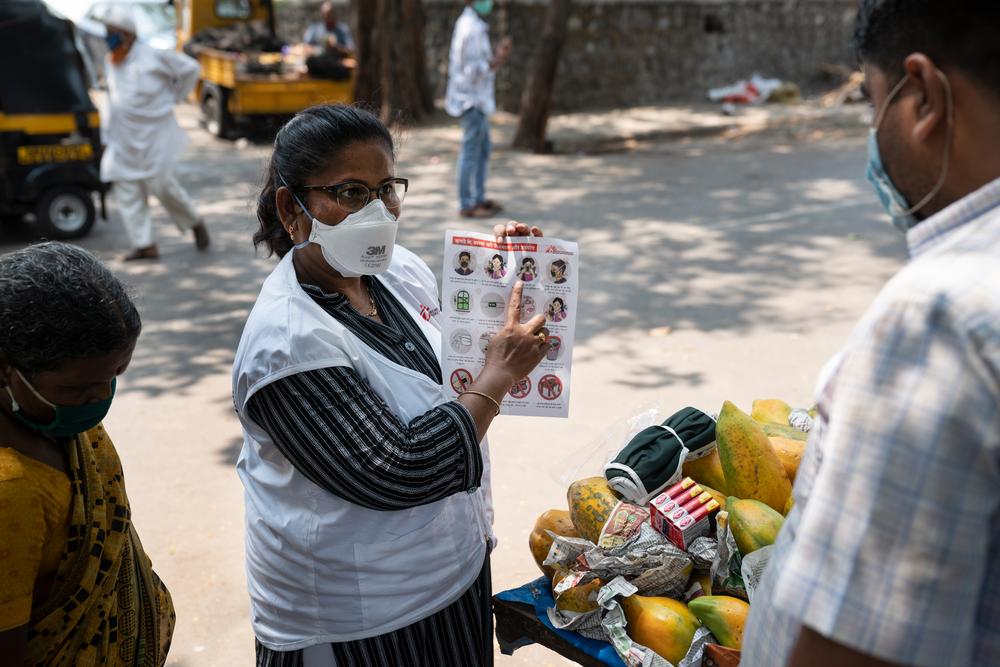
Health Educator conducting educational talk on mask management with a street hawker in M-East Ward, Mumbai. © Premananda Hessenkamp
Doctors Without Borders/Médecins Sans Frontières (MSF) has restarted emergency response amid a surging second wave of COVID-19 in Mumbai in Maharashtra state. Daily new infections across the country have reached a peak of over 200,000 in a single day, with a whopping 115,736 new cases reported in Maharashtra state on a single day on 16 April.
Dilip Bhaskaran, Project Coordinator, shares what Doctors Without Borders has been doing in Mumbai.
We have been collaborating with Municipal Corporation of Greater Mumbai (MCGM) to co-manage Dedicated Jumbo COVID Care Centre in Bandra Kurla Complex (BKC). MCGM is doing a great job and we started this collaboration during the first wave providing patient care. Now, during the second wave, our role is to improve the quality of care for mild/moderate cases and patient dignity in BKC facility. The 2,000-bed hospital is split into 2 phases, having 1,000 beds in each. Right now we’re managing 6 wards in phase 1 and 4 wards in phase 2, every ward has 28 beds in it.
Even though we are a small part of big operation, our job is very important. Increasing the quality of care these patients receive and managing them well with oxygen in the facility means less people will need to go on to ventilator care in ICUs.
Working on quality of care has two aspects: medical and logistic.
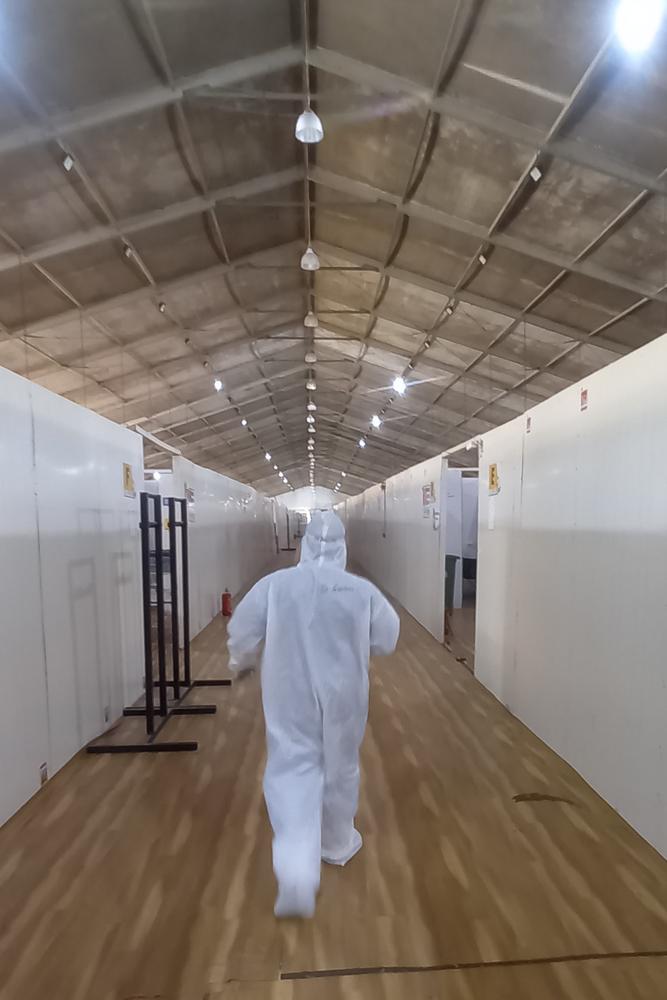
Doctor heading to see patients in Doctors Without Borders/MoH co-managed Dedicated COVID Care Centre in BKC, Mumbai. © Siddhesh Gunandekar
On the medical front the biggest issue is supporting and training new and junior medical staff in public sector. After the first wave a lot of doctors moved on to new positions so now, we’re working with lots of new doctors that are just out of college and need training in patient care and bedside management. It’s the same with pharmacy management and nursing care – the newer staff need supervision. HR is the biggest challenge, particularly for nurses – we’re just not able to find enough nurses.
On the logistical front there is also a lot to be done. Infection, prevention control (IPC) needs to be managed. Water and hygiene needs to be managed. We’re in the middle of summer and it gets very hot inside the tent. Patients are staying in makeshift wards where the temperature can reach more than 40 degrees. We’re trying to help step by step to drastically improve the quality of care.Dilip Bhaskaran, Project Coordinator
For example, this morning quite a few of the tent coolers broke down. These aren’t air conditioners but big fans that blow air though water to cool the space around them. We’ve been trying to get technicians to repair them, so the patients can have some level of comfort but it’s complicated. The set up was done by a management company and they subcontracted the tent coolers from another vendor. They aren’t able to get hold of the spare parts or send out a technician because of the lockdown restrictions. We’ve asked the management team to get the necessary permissions organised but in the meantime we’re trying to find someone else who can help even though we’re under strict lockdown.
Meanwhile the medics are working in PPE kits for more than 6 hours in temperatures higher than 40 degrees and in those conditions both patients and healthcare workers lose a lot of water and can become dehydrated. So, we’re also trying to help resolve a dispute over the supply of power to the facility which would enable air conditioners to be installed. There’s lots of formalities involved and getting problems solved takes a lot of collaboration and work.
Outside of the hospital, we’re also expanding our work in the community. We’ve been working in M-East Ward for a long time, running drug-resistant tuberculosis projects. Mumbai is divided into 24 administrative wards and this is the one where there are a lot of needs. It’s a densely populated area and social distancing is a real challenge. The population is over 800,000 and more than 70% of people here live in informal settlements. These are the most vulnerable communities and our target population for awareness and preventive activities.Dilip Bhaskaran, Project Coordinator
Our health promotion team are putting more efforts to promote COVID-appropriate behaviour and we’re also just about to restart our WASH intervention--cleaning public toilets. These community toilet blocks can be used by over 1000 people daily and are in a terrible condition so they are sites where infection can easily spread.
I’ve been with Doctors Without Borders since 2006 and have worked on many emergencies and overall, we are doing well as a team. It is coordinated action and all team members are equally contributing to achieve the set objective, no major team dynamics. I’m very fortunate to be working with such a great team.
Dilip Bhaskaran has been with Doctors Without Borders since 2006
